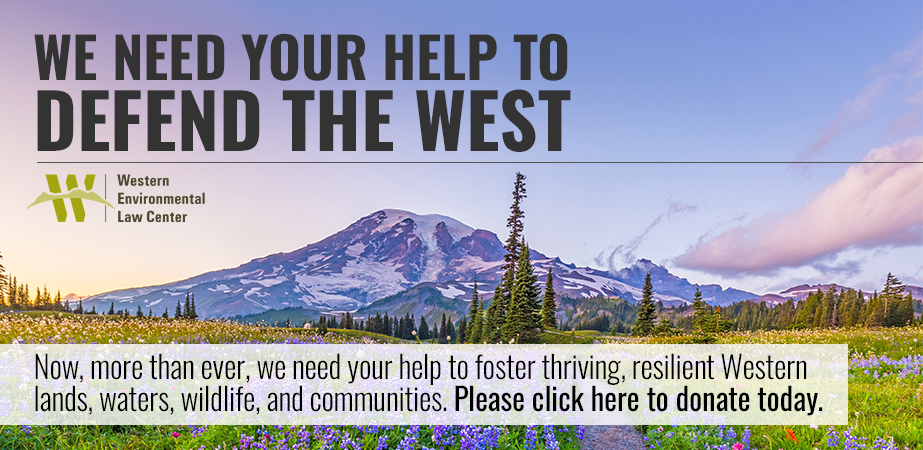Denver
Today a coalition of environmental watchdog groups challenged a Bureau of Land Management (BLM) plan to expand oil and gas drilling on Colorado’s Western Slope, intensifying well density in communities already forced to endure a legacy of industrial gas development. BLM’s Colorado River Valley Resource Management Plan (RMP) failed to analyze the impacts of such concentrated development on human health and wellbeing, ignored the resulting effects on climate change, and failed to consider mitigation measures to reduce these impacts.
The Colorado River Valley RMP acts as a blueprint, guiding how BLM will manage the area’s public lands and minerals over a 20-year time horizon. This is the same time period in which meaningful and serious action must be taken if we are to stem the worst of growing impacts from climate change. BLM’s plan not only perpetuates a model of fossil fuel exploitation on our public lands, but concludes that “it is beyond the scope of analysis” to disclose the climate change impacts of the agency’s decisionmaking.
“Despite month after month of record temperatures, prolonged droughts, and devastating wildfires, BLM audaciously claims it is impossible to know whether doubling the area’s concentration of wells would have a significant impact on our climate,” said Kyle Tisdel of the Western Environmental Law Center. “No problem can be solved by burying your head in the sand. The public deserves an honest accounting of impacts, and we intend to use the power of the law to force BLM to come back with a serious plan that considers climate change.”
“For years we have asked BLM to take a hard look at the impacts of oil and gas development on public lands. On some issues we’ve made progress. In this plan, however, BLM basically left open all our public lands to future leasing and development, and ignored the fact that oil and gas development impacts human health and contributes to climate change,” said Wilderness Workshop’s staff attorney Peter Hart. “We deserve a more thoughtful approach to public land management, and the law requires it.”
The Colorado River Valley Field Office oversees much of the public land in the Piceance Basin, where there are more than 10,000 active oil and gas wells. The RMP projects an additional 6,640 new wells will be drilled into federal minerals in the area during the next 20 years, not including any private wells that may be drilled. The RMP proposes that most future drilling will occur in areas already developed, increasing health impacts to the thousands of people that live within one mile of these areas and additional people that rely on the area’s drinking water and air.
“Communities near public lands have suffered at the hands of oil and gas companies for far too long,” said Alison Kelly, Staff Attorney with the Natural Resources Defense Council. “The federal government should stop allowing this industry to continue putting these residents at risk from the health and safety threats that can come with this development—from respiratory problems and birth defects to cancer.”
“As a long-term resident surrounded by oil and gas development on BLM-managed public lands, I am disappointed with BLM’s inconstancy in this decision,” said Bob Arrington, a resident of Battlement Mesa and member of Western Colorado Congress. “This Colorado River Valley BLM action does not take into account the national BLM effort to curb climate-changing methane emissions by improving oil and gas industry practices. By tripling the number of wells and emissions it negates improved practices and exposes residents like me to not just increased climate changing methane, but the full range of hazardous hydrocarbons, including the carcinogenic benzene. Every BLM field office must fully account for all the impacts on people living in the area when making these decisions.”
“Science tells us that drilling for dirty fuels – especially fracking – causes serious harm to human health and the environment,” said Nathan Matthews of Sierra Club. “BLM ignored this evidence when it decided to allow additional drilling for oil and gas in the Colorado River Valley. BLM can’t sweep these issues aside, and if it had taken a serious look at the issues, it would have recognized that drilling for oil and gas on our public lands is wrong.”
On May 5, 2014, the groups filed a protest with BLM over the proposed RMP and final EIS. On June 12, 2015, BLM signed a record of decision approving the Colorado River Valley RMP and EIS, and later denied the groups protest on July 8, 2015. The plan leaves 603,100 acres open to oil and gas leasing, closing just 2,500 acres in the high potential area for oil and gas.
A copy of the complaint is available here.
Read more about WELC’s work on this issue here.
Contacts:
Kyle Tisdel, Western Environmental Law Center, 575-613-8050, gro.w1751324748alnre1751324748tsew@1751324748ledsi1751324748t1751324748Peter Hart, Wilderness Workshop, 303-475-4915, gro.p1751324748ohskr1751324748owsse1751324748nredl1751324748iw@re1751324748tep1751324748
Emily Hornback, Western Colorado Congress, 970-256-7650, gro.s1751324748sergn1751324748occw@1751324748ylime1751324748Alison Kelly, Natural Resources Defense Council, 202-717-8297, gro.c1751324748drn@y1751324748lleka1751324748Nathan Matthews, Sierra Club, 415-977-5695, gro.b1751324748ulcar1751324748reis@1751324748sweht1751324748tam.n1751324748ahtan1751324748

